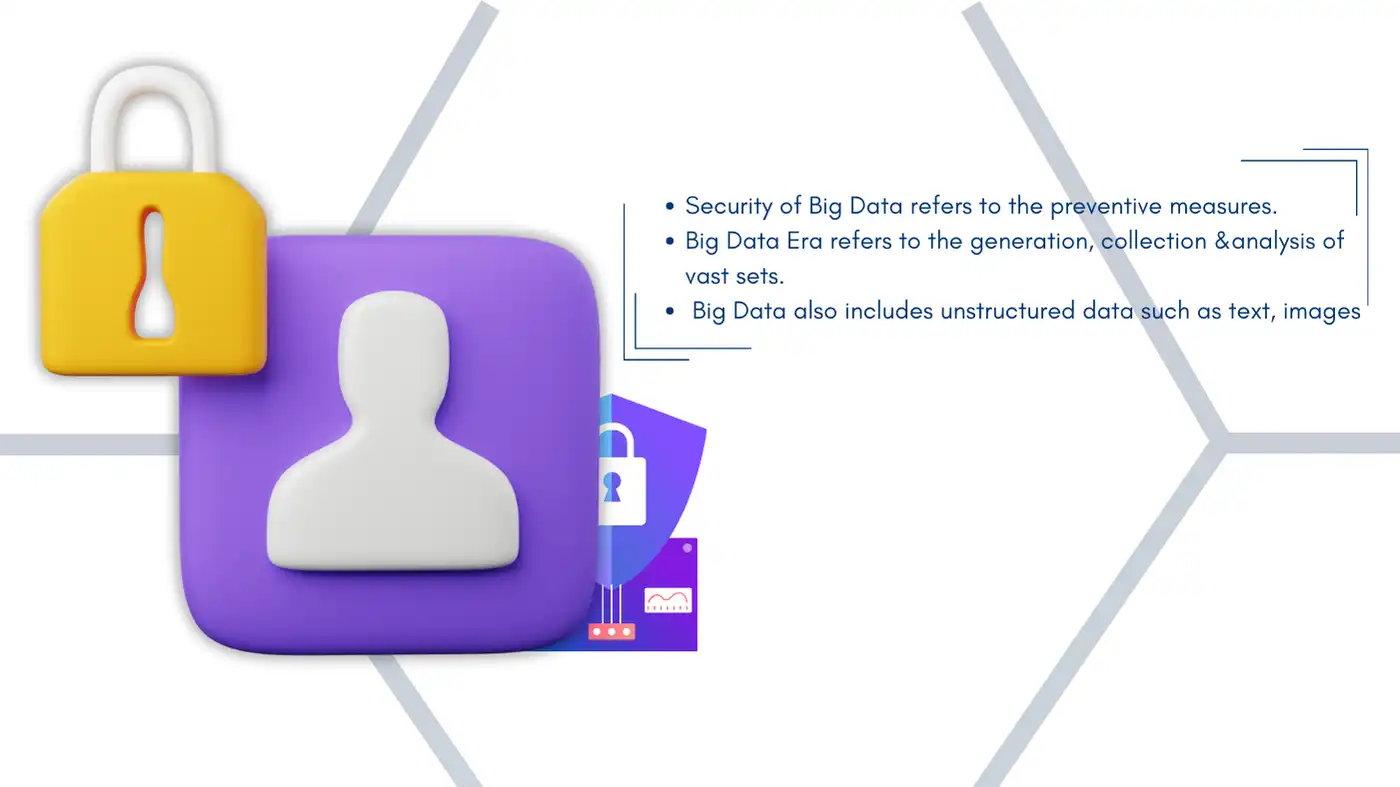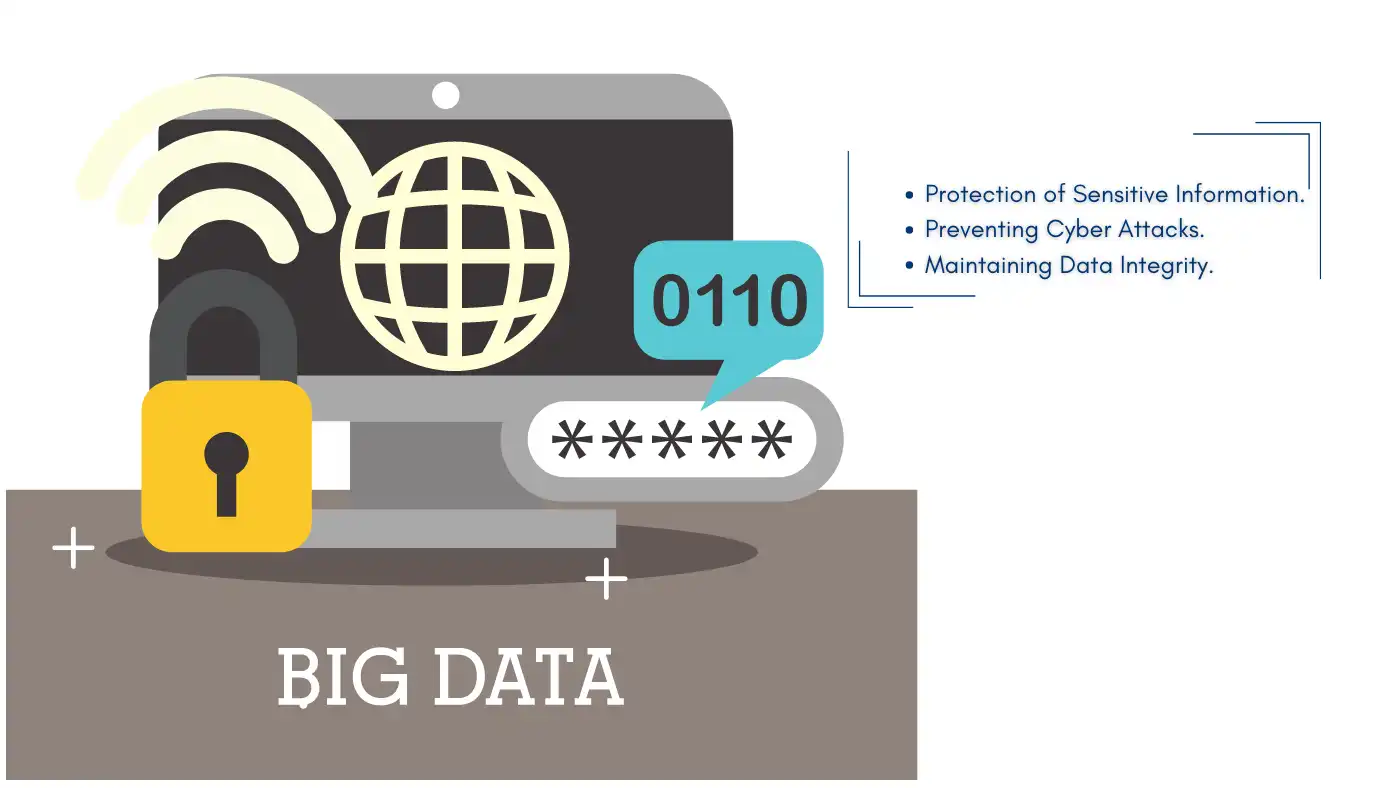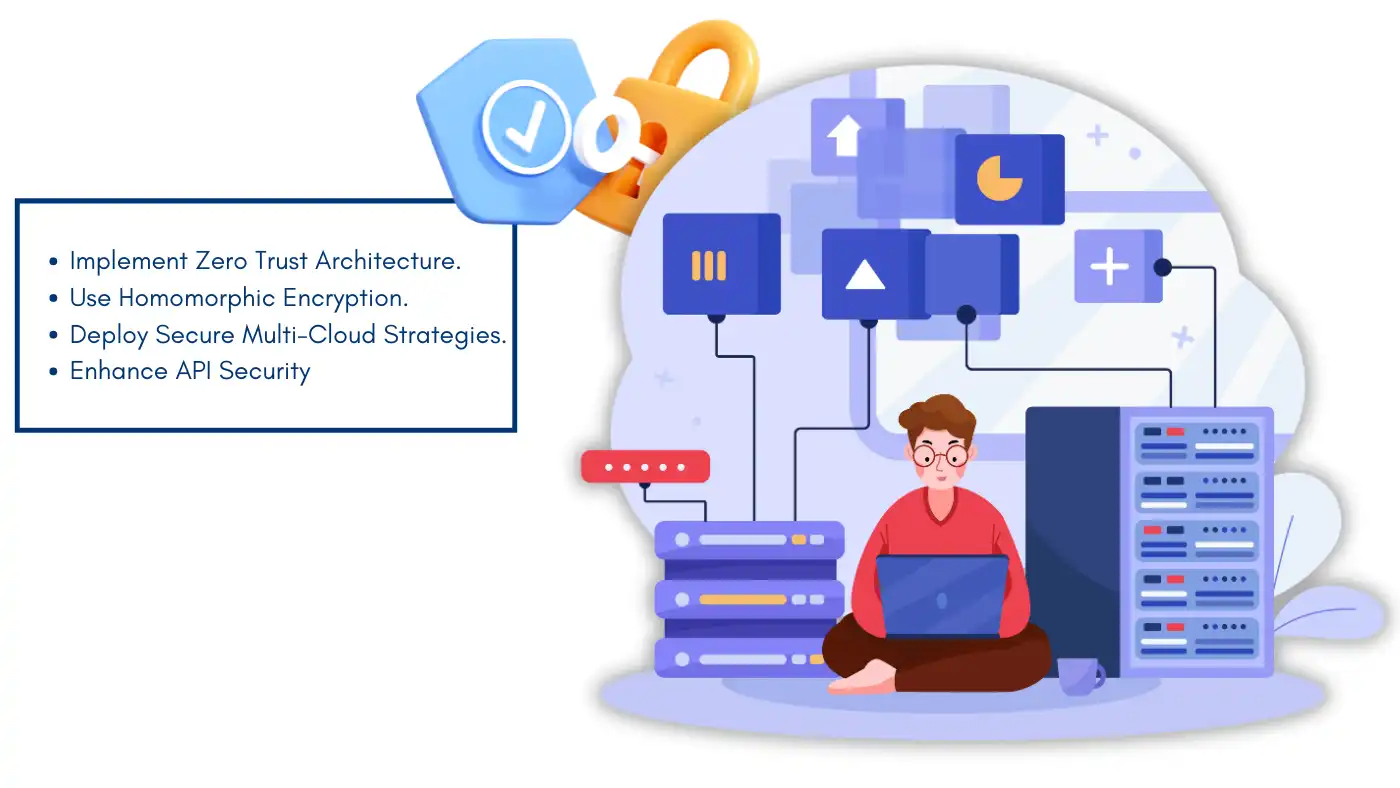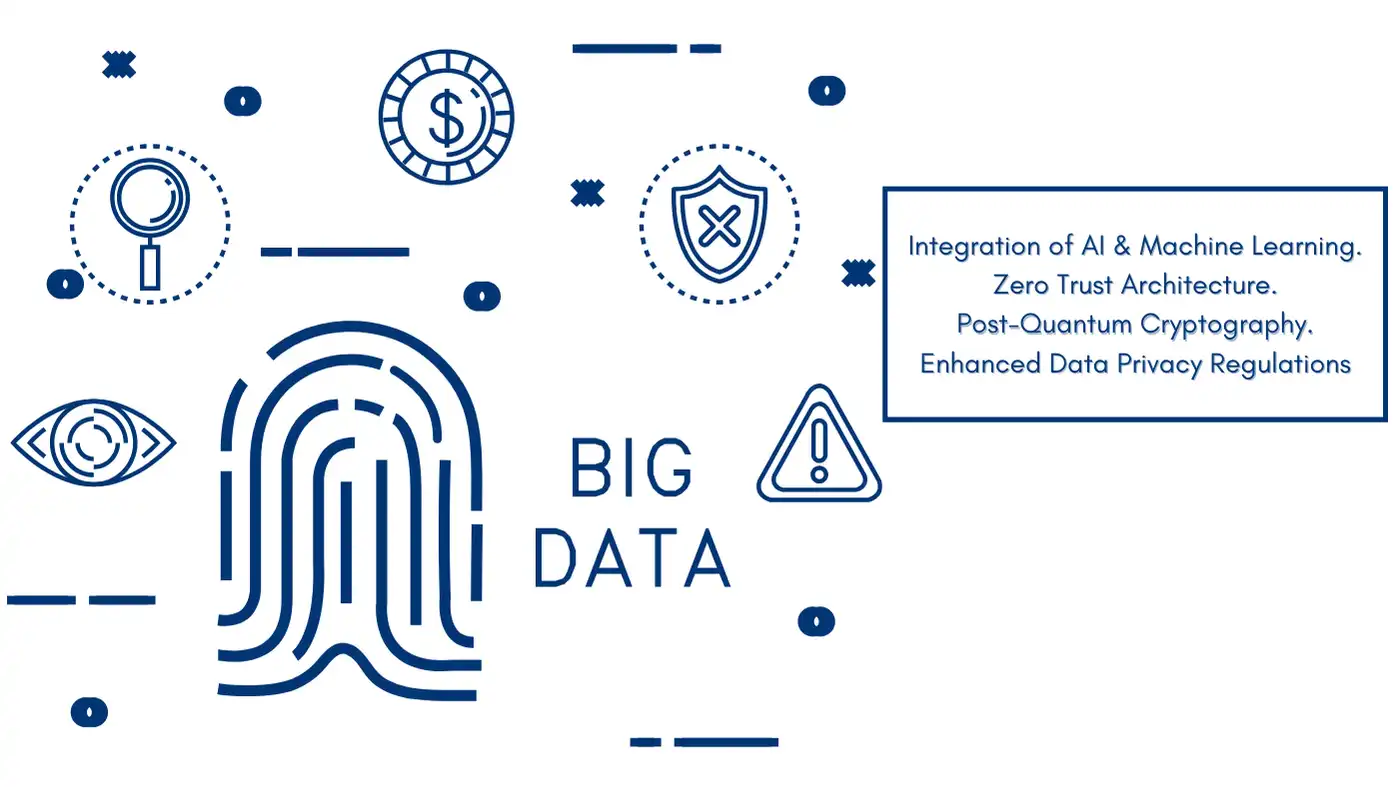How To Secure Your Data In The Era Of Big Data?” It is a question we have all wondered about, right?
Especially with all the talk about Big Data these days. We are living in a world where our digital footprints are huge. Every time we post something on social media, shop online or even just browse the web, we are creating data.
It is pretty amazing what this data can do for us, but it also means we need to be extra careful.
But don’t worry. We are not helpless against these challenges. There are plenty of ways we can keep our data safe, even in this Big Data era.
We will chat about what Big Data security really means, why it matters and most importantly, how we can protect ourselves. We will keep it simple, practical and maybe even a little fun. Let us dive in and learn how to stay safe in this data-filled world.
What Is Big Data Security?

The security of Big Data refers to the preventive measures, technologies, and methods that are used to protect hard or soft data privacy from any unauthorized access, theft, breach, or corruption, which often leads to significant privacy issues with technology.
This means data from the time it is collected, to when it’s stored, gets processed, and analyzed. Due to the huge size and various types of Big Data, it needs more integrated and stiffer security features in place compared with traditional data.
What is the Era of Big Data?
Big data era refers to the generation, collection and analysis of vast sets that have become frequent in every corner of modern life.
This is occurring due to the increasing use of technology. We are in a period of unparalleled levels, types and pace of data as well the tools and technologies that have evolved to analyze vast quantities.
Key Characteristics of Big Data Security
Volume: Data is growing like crazy, in a massively way beyond traditional data storage and processing. Organizations today take in and keep terabytes and even petabytes worth of data ranging from social media interactions to sensor data coming off IOT devices.
Variety: Data is not just in structured formats like databases. Big Data also includes unstructured data such as text, images or videos and semi-structured data like XML or JSON. Such variety means new ways of storing, processing and analyzing are needed.
Velocity: We operate in a world where data is generated at an unmatched rate. Many areas require decisions where timing is an important factor to working on large datasets quickly enough. For example financial trading, healthcare monitoring and on any online customer interactions.
Value: It is not in its size that the big data has a value, it should bring as much information and excess of wealth. Big Data enables organizations to get information from a pool of data, find patterns and make data-driven decisions that were previously impossible with smaller datasets.
Complexity: Managing, storing and analyzing such large and varied datasets is complex. It depends on the latest technologies including distributed computing, cloud storage and software frameworks like Hadoop or Spark.

- Lightning-fast speeds to browse without lag
- Servers in 105+ countries around the globe
- Military-grade security to stay safe online
- Try it risk-free with its money-back guarantee
- Native apps for all major devices
Why Is Big Data Security Important?

Protection of Sensitive Information: Big data often contains personal, financial and confidential information. This data if leaked will lead to theft, loss and can harm any person or organization.
Regulatory Compliance: Governments and regulatory bodies across the globe have passed strict data protection laws like GDPR and CCPA, that direct organizations to protect personal information of both employees related to business as well as users. Failure to comply can lead to heavy fines, legal troubles and the loss of customer confidence.
Preventing Cyber Attacks: As data becomes more valuable, the harder criminals will try to steal it. Big Data security methods help in the reduction of cyber threats such as breach, ransomware attack and more that can harm an organization in no time.
Maintaining Data Integrity: In the age of Big Data, decisions are always preceded by data. Consistent, reliable and factual data is important for accurate business decision-making, innovation and competitive advantage.
Preserving Reputation and Trust: A data breach can spoil an organization’s title. Securing Big Data is the best way to keep your customers trust and protect from a disruptive brand reputation.
What Are The Threats In Big Data Security?
In the era of big data, while there are huge opportunities and several emerging threats have become increasingly significant. Here are some of the latest threats:
Data Breaches and Leaks
As more data is collected and stored, the risk of large-scale data breaches increases too.
Databases that contain valuable information such as personal data, financial records and health data are always under the inspection of hackers.
This can result in the exposure of remarkable amounts of highly sensitive data and therefore damages to both persons and corporations.
Privacy Erosion
As this personal data is bought and sold across the web, so grows a high possible threat to privacy with literally everyone at risk.
This is done without the clear permission of users and since companies often track data alongside governments, it leads to questions about how such surveillance interrupts personal privacy and control over information.
Bias and Discrimination
Big data is also the input library that algorithms use to make decisions affecting human life, such as credit scoring or job applications and legal judgments.
When the input data is biased, this indicates that decisions in consequence can also reinforce discrimination and inequality which can handle certain groups unfairly.
Data Misuse and Manipulation
Data can also be manipulated to fit certain molds or narratives. Mistakes with data can lead to faulty conclusions that might misinform the public, disorder business strategies or shake election results.
Cybersecurity Threats
With more data comes greater cybersecurity risks. With the rise of APTs that can sneak past even well-guarded walls and silently mine top-secret documents in the background for months or even years, cybercriminals are coming up with clever ways to break data infrastructures.
Loss of Anonymity
Since the beginning of big data, it has become nearly impossible to hide behind a cloak of anonymity.
Even when data is hidden, advanced techniques can re-identify individuals by cross-referencing different data sets and threatening personal privacy.
Data Quality and Integrity Issues
The large size of big data can sometimes result in problems with data quality and accuracy.
There could be errors in analysis and decision-making because of outdated or incomplete information.
It can have consequences ranging from business results to public policy.
Over-reliance on Data-Driven Decisions
As much as we all defend data-driven decisions, they are very uncomfortable for risk managers.
If decision-makers ignore the context or qualitative factors that data can’t capture, it may lead to misguided strategies or unethical choices.
Environmental Impact
Big data storage and processing necessitate significant computational resources, which can result in high energy consumption and carbon footprint.
As the volume of data continues to grow, so does our concern for the environmental footprint that data centers leave behind.
In this era, while Big Data offers numerous benefits, these emerging threats highlight the need for robust data protection measures and ethical practices.
How To Secure Your Data In The Era Of Big Data?

Securing your data in the era of Big Data is very important. Given the big amounts of information being generated, stored, and processed, ensuring data security in big data is essential.
Here are some of the latest and most effective ways to secure your data in the era of big data:
Implement Zero Trust Architecture
Zero Trust is a security concept that does not trust any user, device or application by default.
Even if they are inside the network perimeter. All must be verified incontinently and incipiently. This approach involves:
- Strict identity verification for users and devices.
- Micro-segmentation of Networks to minimize access.
- Least privilege if a user only needs specific access, give them that.
Adopt AI-Powered Threat Detection
Use machine learning and AI for Threat Detection and Response.
It can often analyze data in real-time on a global scale, spot outlying patterns or behaviors and react to threats quicker than previous procedures.
Adapting and maturing with time, AI-driven tools can grow along these lines by staying a step ahead of new threats.
Use Homomorphic Encryption
Homomorphic encryption enables data to be processed and analyzed in its encrypted form as well.
The effect is that computations can be performed on sensitive data without ever having to decrypt it, dramatically reducing the risk of exposure and enhancing data security in big data environments.
This is important in areas like healthcare and finance, where data privacy is crucial.
Implement Blockchain for Data Integrity
Blockchain technology can be used to secure and verify the integrity of data.
The impact of blockchain in cybersecurity is significant because the data in blockchain cannot be tampered with or altered, as transactions are recorded on an unchangeable ledger.
This will have applications for the security of data belonging to supply chains, financial transactions, and sensitive records, among other things.
Enhance Data Anonymization Techniques
With the rise in re-identification risks, more powerful anonymization techniques are required.
You can use methods like differential privacy to introduce some “noise” into data so it may be studied without leaking your identities.
In so doing, this method takes measures to protect the privacy on your end data even if that is accessed but it can not be traced.
Deploy Secure Multi-Cloud Strategies
Managing data security across a variety of environments has become important as more and more organizations are employing multiple cloud providers.
Big data threats are increasingly relevant in this context, making a secure multi-cloud strategy essential. A secure multi-cloud strategy includes:
- Uniform encryption strategies across all cloud solutions.
- Manage security policies and access controls centrally.
- Audits to evince adherence of security standards.
Enhance API Security
APIs (Application Programming Interfaces) are important for data integration in big data environments.
But they are also a common attack point, especially in the face of big data threats. Securing APIs involves:
- Building robust authentication and authorization standards.
- Regularly testing for weaknesses.
- Monitoring and securing API traffic with API gateways.
Practice Secure Data Deletion
Make sure data is securely removed when no longer necessary such as with GDPR compliance.
These methods are data wiping, demagnetizing and physical destruction of storage devices so that the deleted data cannot be recovered.
Incorporate Data Loss Prevention (DLP)
Data Loss prevention tools protect data in use, at rest, and over the wire.
Newer DLP solutions, especially in the context of data privacy in big data, use artificial intelligence to detect where sensitive data resides and apply security policies that block any unauthorized access or unintentional sharing, even if the data is moved or worse yet copied.
Regularly Audit and Monitor Data Access
Enforce continuous auditing and tracking mechanisms to know who is using your data and how it is being used.
For example, with enhanced monitoring tools in place, alerts are built for real-time response to potential breaches as soon as some unusual or unauthorized access pattern is discovered on the resources.
This is particularly crucial for ensuring data privacy in big data environments.
Educate and Train Employees on Data Security
Human error is often a weak link in data security. Consistent training can help employees become the first line of defense for data security.
Regular updates regarding dos and don’ts, phishing threats are the best practices to maintain a safe data handling culture is key in training.
Use Secure Data Sharing and Collaboration Tools
When you are data sharing, especially large or sensitive datasets, you can use secure collaboration tools that provide end-to-end encryption and access controls with audit trails.
This keeps your data secure, including when it needs to be shared with external partners or stakeholders.
With these advanced methods, you can boost the security of your data in the era of big data protection and that too from big developing threats.

Uninterrupted, high-speed browsing, zero logs so your online activity is always private.
Over 7000 people checked out NordVPN in the last month
Big Data Security: The Next Era

Big data protection in the future is going to change as we are seeing a growth of data and processing capability that requires new ways of thinking about how one secures big data.
For organizations that are turning to big data for its promise of insights and innovation, big data protection is by far one of the most important aspects they need to consider.
Here are top trends and future developments to watch in big data security:
Integration of AI and Machine Learning
This is expected to be one of the key areas where AI and machine learning would serve as a game changer, ensuring better data security in big data.
They would do so by analyzing massive quantities of data from logs in order to identify scenario-based attacks.
Adapting AI-Powered Security Systems AI-based systems will be programmed to adapt their responses and improve over time by learning from each new threat they face.
Confidential Computing
Confidential computing is expected to gain prominence as a method to protect sensitive data during processing.
This approach keeps data encrypted at all times, even when it is processed but isolated from the right keys to properly decrypt it within hardware-backed Trusted Execution Environments (TEEs).
This is important in certain industries such as healthcare and finance, which can handle very private information.
Zero Trust Architecture
In big data security, the Zero Trust security model will grow and be used even further.
This method will lead them to apply robust verification for each user, device and data access request thus significantly shrinking the unauthorized intrusion probability.
Post-Quantum Cryptography
Quantum Computing significantly threatens current encryption techniques.
The future of Big data security will revolve around post-quantum cryptography or encryption methods that are secure against an attack on the scale only quantum computing power could deliver.
This is important when it comes to the future, proofing data against possible quantum attacks.
Enhanced Data Privacy Regulations
Governments in every jurisdiction around the world are going to implement tighter regulations concerning data privacy in big data, with countless reports of breaches and mishandling.
Enterprises will have to embrace additional security technologies that can ensure data is protected, stronger access control, or enhanced techniques for managing the wealth of data they store.
Automated Compliance and Security Management
The danger is that, with data laws only becoming greater and more strict in their demands for compliance from organizations of all sizes, big data protection measures are becoming increasingly crucial.
The consumption of regulatory tools will increase significantly. These will help make sure that data handling practices meet regulatory demands, reducing sanctions and legal cases.
FAQs
How can we protect ourselves from Big Data?
What is data privacy and security in the era of Big Data?
How can you ensure that your data is secure?
What are 5 ways to secure data?
How to secure data in Big Data?
Conclusion
We have covered a lot of ground. Securing our data in the Big Data era is not just about dodging hackers or having super-strong passwords.
It is about understanding our data’s value and taking smart steps to protect it. Always remember, you don’t need to become a cybersecurity guru overnight.
It is all about making small, continuous changes to how we handle our digital lives. Every little step counts.
The future of Big Data security might seem a bit overwhelming, but we have got this.
By staying informed and making smart choices, we can enjoy all the cool benefits of Big Data security while keeping the risks in check.
So let us make data security a priority. After all, in this big digital world, we are our own best defenders.
Stay safe out there, and remember, knowledge is your superpower in the world of Big Data security.






